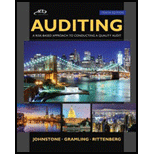
a.
Introduction:Professional skepticism can be explained as the confirmation of information through inquiry, the significant evaluation of the shreds of evidence obtained and focusing more on the inconsistencies.
To explain:The term professional skepticism.
b.
Introduction:Professional skepticism can be explained as the confirmation of information through inquiry, the significant evaluation of the shreds of evidence obtained and focusing more on the inconsistencies.
To identify:The reason why professional skepticism is helpful in frauds detection.
c.
Introduction:Professional skepticism can be explained as the confirmation of information through inquiry, the significant evaluation of the shreds of evidence obtained and focusing more on the inconsistencies.
To identify:The key behaviors that are necessary for professional skepticism.
d.
Introduction:Professional skepticism can be explained as the confirmation of information through inquiry, the significant evaluation of the shreds of evidence obtained and focusing more on the inconsistencies.
To identify:The difficulties for auditors to exercise professional skepticism.
e.
Introduction:Professional skepticism can be explained as the confirmation of information through inquiry, the significant evaluation of the shreds of evidence obtained and focusing more on the inconsistencies.
To identify: The characteristics and behaviors of the client companies to examine the authenticity in evidences provided by them.
Want to see the full answer?
Check out a sample textbook solution
Chapter 2 Solutions
Auditing: A Risk Based-Approach to Conducting a Quality Audit
 Auditing: A Risk Based-Approach (MindTap Course L...AccountingISBN:9781337619455Author:Karla M Johnstone, Audrey A. Gramling, Larry E. RittenbergPublisher:Cengage Learning
Auditing: A Risk Based-Approach (MindTap Course L...AccountingISBN:9781337619455Author:Karla M Johnstone, Audrey A. Gramling, Larry E. RittenbergPublisher:Cengage Learning Auditing: A Risk Based-Approach to Conducting a Q...AccountingISBN:9781305080577Author:Karla M Johnstone, Audrey A. Gramling, Larry E. RittenbergPublisher:South-Western College Pub
Auditing: A Risk Based-Approach to Conducting a Q...AccountingISBN:9781305080577Author:Karla M Johnstone, Audrey A. Gramling, Larry E. RittenbergPublisher:South-Western College Pub- Business/Professional Ethics Directors/Executives...AccountingISBN:9781337485913Author:BROOKSPublisher:Cengage



